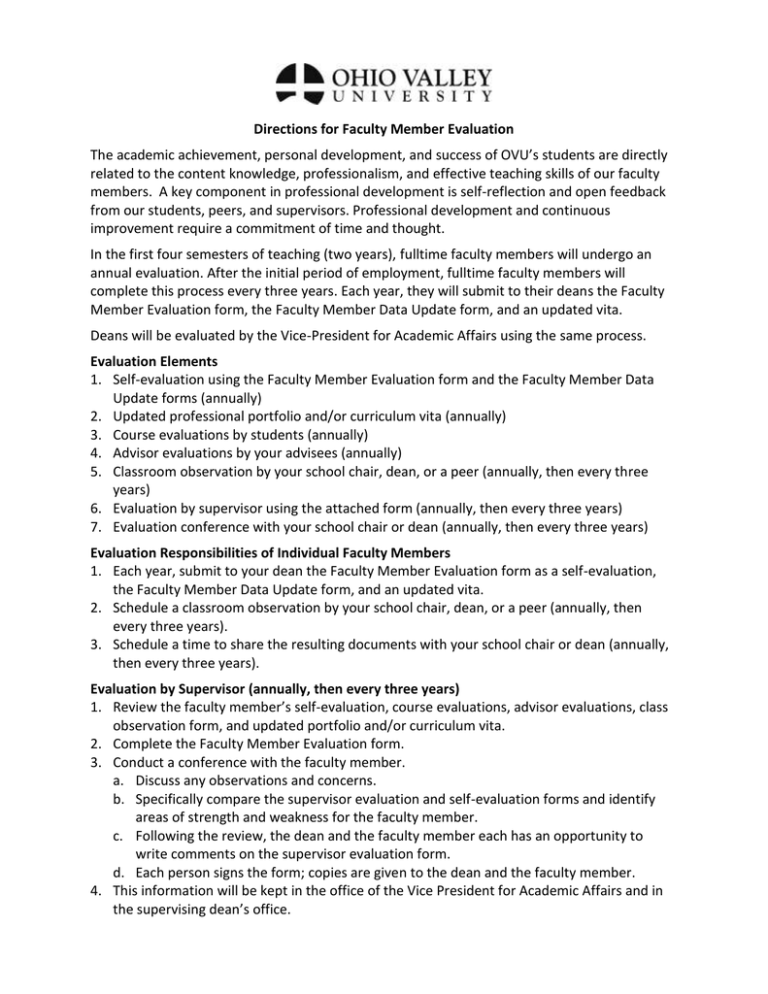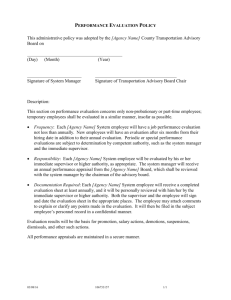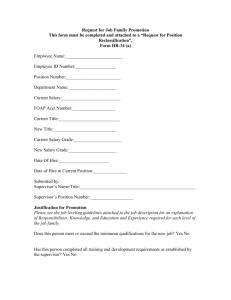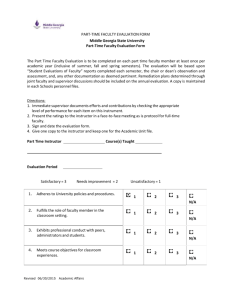Faculty Evaluation 2013
advertisement

Directions for Faculty Member Evaluation The academic achievement, personal development, and success of OVU’s students are directly related to the content knowledge, professionalism, and effective teaching skills of our faculty members. A key component in professional development is self-reflection and open feedback from our students, peers, and supervisors. Professional development and continuous improvement require a commitment of time and thought. In the first four semesters of teaching (two years), fulltime faculty members will undergo an annual evaluation. After the initial period of employment, fulltime faculty members will complete this process every three years. Each year, they will submit to their deans the Faculty Member Evaluation form, the Faculty Member Data Update form, and an updated vita. Deans will be evaluated by the Vice-President for Academic Affairs using the same process. Evaluation Elements 1. Self-evaluation using the Faculty Member Evaluation form and the Faculty Member Data Update forms (annually) 2. Updated professional portfolio and/or curriculum vita (annually) 3. Course evaluations by students (annually) 4. Advisor evaluations by your advisees (annually) 5. Classroom observation by your school chair, dean, or a peer (annually, then every three years) 6. Evaluation by supervisor using the attached form (annually, then every three years) 7. Evaluation conference with your school chair or dean (annually, then every three years) Evaluation Responsibilities of Individual Faculty Members 1. Each year, submit to your dean the Faculty Member Evaluation form as a self-evaluation, the Faculty Member Data Update form, and an updated vita. 2. Schedule a classroom observation by your school chair, dean, or a peer (annually, then every three years). 3. Schedule a time to share the resulting documents with your school chair or dean (annually, then every three years). Evaluation by Supervisor (annually, then every three years) 1. Review the faculty member’s self-evaluation, course evaluations, advisor evaluations, class observation form, and updated portfolio and/or curriculum vita. 2. Complete the Faculty Member Evaluation form. 3. Conduct a conference with the faculty member. a. Discuss any observations and concerns. b. Specifically compare the supervisor evaluation and self-evaluation forms and identify areas of strength and weakness for the faculty member. c. Following the review, the dean and the faculty member each has an opportunity to write comments on the supervisor evaluation form. d. Each person signs the form; copies are given to the dean and the faculty member. 4. This information will be kept in the office of the Vice President for Academic Affairs and in the supervising dean’s office. Faculty Member Evaluation (Self or Supervisor) Faculty Member’s Name: _____________________________ Supervisor’s Name: ___________________________ Date ______________________ Evaluator: _____ Self _____ Supervisor Indicate if basic requirements for faculty member have been met over the last evaluation period. Basic Requirements Meets full work load equivalency Met Unmet Keeps at least 10 regular office hours per week Met Unmet Actively participates in 2 or more committees Met Unmet Maintains an advisee load Met Unmet Indicate if the following tasks have been met over the last evaluation period. Comment on needed improvement, exemplary performance or other pertinent information. ACTIVITY 1. Professionalism 1.1 Maintains appropriate classroom behavior Yes No N/A 1.2 Personally maintains proper dress code Yes No N/A 1.3 Responds to administrative requests appropriately Yes No N/A 1.4 Maintains current curriculum vita Yes No N/A 1.5 Sets and accomplishes goals Yes No N/A 2.1 Follows course descriptions and learning outcomes in courses taught Yes No N/A 2.2 Takes regular attendance Yes No N/A 2.3 Enforces school attendance policy Yes No N/A Yes No N/A Yes No N/A Yes No N/A Yes No N/A 2. Course administration 2.4 Requires tasks and assessments to assign a fair final grade 2.5 Provides effective feedback to students in timely manner. 2.6 Encourages class to complete faculty/course evaluations 2.7 Maintains appropriate behavior in the classroom 1 3. Syllabi 3.1 Each syllabus contains all required elements Yes No N/A 3.2 Provides syllabi to students Yes No N/A Yes No N/A Yes No N/A 4.1 Attends faculty meetings Yes No N/A 4.2 Attends faculty workshops Yes No N/A Yes No N/A Yes No N/A 5.1 Meets regularly with advisees Yes No N/A 5.2 Is accessible to students Yes No N/A 5.3 Attends Chapel and Assembly regularly Yes No N/A 5.4 Seeks informal interaction with students Yes No N/A 6.1 Hosts students at home Yes No N/A 6.2 Mentors at least one student per year Yes No N/A 6.3 Presents at professional conferences Yes No N/A 6.4 Attends student events (e.g., games, performances) Yes No N/A 6.5 Takes active role in church life Yes No N/A 6.6 Participates in community service Yes No N/A 6.7 Secures grants Yes No N/A 6.8. Publishes in discipline Yes No N/A 6.9 Progressing toward degree, if applicable Yes No N/A 3.3 Each syllabus contains a Faith & Learning statement 3.4 Provides syllabi to Office of Academic Affairs 4. Professional development 4.2 Holds membership in a professional association 4.3 Participates in professional development activities 5. Fostering campus community 6. Going above and beyond 2 EVALUATION OF COURSES: Mark the teaching/learning strategies used in some or all the courses taught this year. Instructional Methods Field trip(s) Lecture Hands-on materials ___________________ Group work Simulations Student presentations Guest speaker(s) Learning activities/games One-on one instruction Interaction with Instructor and Classmates Class discussion Sakai forums Group work ___________________ Peer tutoring PowerPoint Textbook website Smartboard/Mimeo Sakai Overhead projector Digital response device Project-based learning Worksheets Presentations Field Experience Journal/reflections Hands-on activities ___________________ Research using library resources Research using websites Textbook companion website Objective test questions Open-ended test questions Rubrics Instructional Technology Movies/videos Specialty software Document camera ___________________ Assignments/Assessments Chapter summaries Website evaluation Papers/essays Class discussion Homework Quizzes Group tasks/discussion Comments by Supervisor: Comments by Faculty Member: __________________________________________ Signature of Faculty Member Date ____________________________________ Signature of Supervisor Date 3 OVU Faculty Member Data Update Name: _______________________________ Academic Year: ______________ Please check each college in which you teach a course. Arts and Sciences Business Biblical Studies and Behavioral Sciences Education 1. Courses taught this year (note if it is an independent study): 2. List any updates on your curriculum vita: progress made toward degree, new degree, professional affiliations, conferences attended, presentations, publications, grants, awards, etc. 3. List which OVU committees you serve on and your responsibilities on the committees: 4. Church home, church activities/responsibilities, community involvement/service: ___________________________________________ ___________ Signature of Faculty Member Date Classroom Observation Summary Faculty Member’s Name: ______________________ Observer’s Name: ______________________ Date: _____________ Time: _____________ Course Observed: _______________________ Directions: 1) Please use the list of teacher behaviors below as a guide to making observations, not as a list of required characteristics. 2) Check the box that best represents your response. Use the comment space below each section to provide more feedback or suggestions. 1. Organization 1.1 Began/ended class on time & in an orderly way 1.2 Had a clear learning outcome/objective 1.3 Focused on the main topic(s) 1.4 Summarized main points at the end of class 1.5 Appeared well prepared for class Accomplished Well Some Emphasis Not Observed Accomplished Well Some Emphasis Not Observed Comments: 2. Teaching-Learning Process 2.1 Used teaching methods appropriate for the content 2.2 Used appropriate instructional supports (e.g., print, technology, audiovisual materials, etc.) 2.3 Assisted student attentiveness by varying pace or activity 2.4 Presented from strategic place(s) in the classroom (can see what students are doing) 2.5 Writing in visual presentation was large/legible 2.6 Spoke audibly and clearly 2.7 Communicated enthusiasm for content 2.8 Explained ideas with clarity 2.9 Related new ideas to familiar concepts 2.10 Used humor appropriately to strengthen retention & interest 2.11 Cited authorities to support statements 2.12 Presented divergent views when appropriate 2.13 Demonstrated command of subject matter 2.14 Made lesson content relevant with real world applications 2.15 Explained tasks/assignments effectively 2.16 Presented challenging questions to stimulate discussion 1 Comments: 3. Instructor-Student Interactions 3.1 Respect diverse points of view 3.2 Knew and used students’ names 3.3 Treated class members equitably 3.4 Created an effective learning environment Accomplished Well Some Emphasis Not Observed Accomplished Well Some Emphasis Not Observed Comments: 4. Assessment 4.1 Solicited students’ participation 4.2 Listened to student comments and questions 4.3 Asked questions to monitor students’ understanding 4.4 Restated questions and answers when needed 4.5 Responded to wrong answers constructively Comments: Overall: 1. What were the instructor’s major strengths as demonstrated in this observation? 2. What suggestions do you have for improving this instructor’s skills? __________________________________________ Signature of Faculty Member Date ____________________________________ Signature of Observer Date 2







